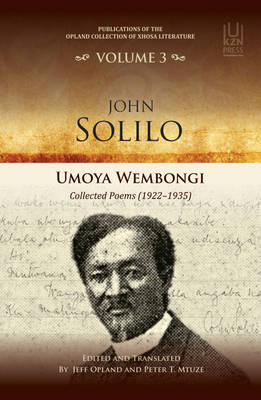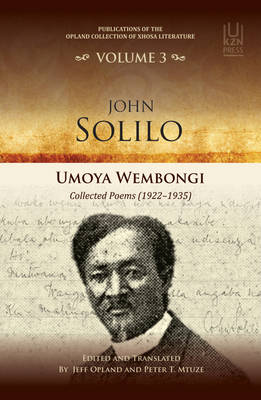
- Retrait gratuit dans votre magasin Club
- 7.000.000 titres dans notre catalogue
- Payer en toute sécurité
- Toujours un magasin près de chez vous
- Retrait gratuit dans votre magasin Club
- 7.000.0000 titres dans notre catalogue
- Payer en toute sécurité
- Toujours un magasin près de chez vous
John Solilo
Umoya Wembongi Collected Poems (1922-1935)Volume 3
29,45 €
+ 58 points
Description
For 40 years, between 1900 and 1939, John Solilo (1864-1940) was a prolific contributor to Xhosa-language newspapers under his own name and under the pseudonyms Mde-ngelimi (Master Wordsmith) and Kwanguye (It's Still Him). He submitted letters and articles on a variety of issues, local news reports from Cradock and Uitenhage, and a considerable body of poetry. Solilo's major literary contribution was his collection of poems entitled Izala, published in 1925, the earliest volume of poetry by a single author in the history of Xhosa literature. His poetry was inspired by umoya wembongi, the spirit of the imbongi, the praise poet whose stirring declamations roused his audiences to action or contemplation. Solilo's literary reputation today, however, is at variance with his prominence as a major author in the first four decades of the twentieth century: he is hardly mentioned, if at all, by literary historians. That neglect is perhaps not surprising: Izala has long been out of print, and copies can no longer be located. The present volume is therefore an exercise in reclamation and restitution. In restoring to the public domain the 65 poems that made up Izala and adding an additional 28 that were published in newspapers both before and after the appearance of Izala, the editors hope to revive John Solilo's reputation as a poet, and to establish his status as a pre-eminent Xhosa author. Jeff Opland commenced his academic career as a medievalist, but for the past 40 years he has assembled a collection of oral and printed poetry and has devoted himself to defining and restoring the heritage of literature in the Xhosa language. Amongst other works, with Peter Mtuze he edited two anthologies of Xhosa literature, Isigodlo sikaPhalo (1983) and Izwi labantu (1994). Opland is currently Visiting Professor in the School of Languages: African Language Studies at Rhodes University. Peter T. Mtuze is the most prolific living isiXhosa writer. He has authored and co-authored no fewer than 30 books. His main contribution is in creative writing: he has produced novels, short stories, essays, drama, poetry, autobiography and language books. Mtuze's first book, UDingezweni, which appeared as far back as 1966, is regarded as a classic novel. One of his singular achievements was his translation of former President Nelson Mandela's autobiography, Long Walk to Freedom, into isiXhosa. He worked on the University of Fort Hare Xhosa Dictionary Project, at the University of South Africa and at Rhodes University, where he retired as Professor Emeritus. (Series: Publications of the Opland Collection of Xhosa Literature, Vol. 3) [Subject: Poetry, African Studies]
Spécifications
Parties prenantes
- Editeur:
Contenu
- Nombre de pages :
- 434
- Langue:
- Anglais
- Collection :
- Tome:
- n° 3
Caractéristiques
- EAN:
- 9781869143121
- Date de parution :
- 28-07-16
- Format:
- Livre broché
- Format numérique:
- Trade paperback (VS)
- Dimensions :
- 150 mm x 229 mm
- Poids :
- 612 g

Les avis
Nous publions uniquement les avis qui respectent les conditions requises. Consultez nos conditions pour les avis.





